Entrepreneurship Report: Unit 9 - Business Ventures and Skills
VerifiedAdded on 2020/06/05
|13
|4530
|72
Report
AI Summary
This report provides a comprehensive overview of entrepreneurship, exploring different types of ventures including small businesses, scalable start-ups, large company entrepreneurship, and social entrepreneurship. It examines the similarities and differences between these ventures, focusing on their objectives, funding, and risk factors. The report also analyzes the impact of micro and small businesses on the economy, highlighting their role in job creation, innovation, and community support. It differentiates between small, medium, and large businesses based on ownership, decision-making, and employee size. Furthermore, it discusses the scope, development, and growth of entrepreneurial ventures, and provides insights into the traits and skills of successful entrepreneurs, as well as the factors that can either hinder or foster entrepreneurial endeavors. The report also delves into the application of entrepreneurship in both public and corporate sectors, and offers a detailed evaluation of the impact of small businesses on different levels of the economy.

UNIT 9
ENTREPRENEURSHIP
ENTREPRENEURSHIP
Paraphrase This Document
Need a fresh take? Get an instant paraphrase of this document with our AI Paraphraser
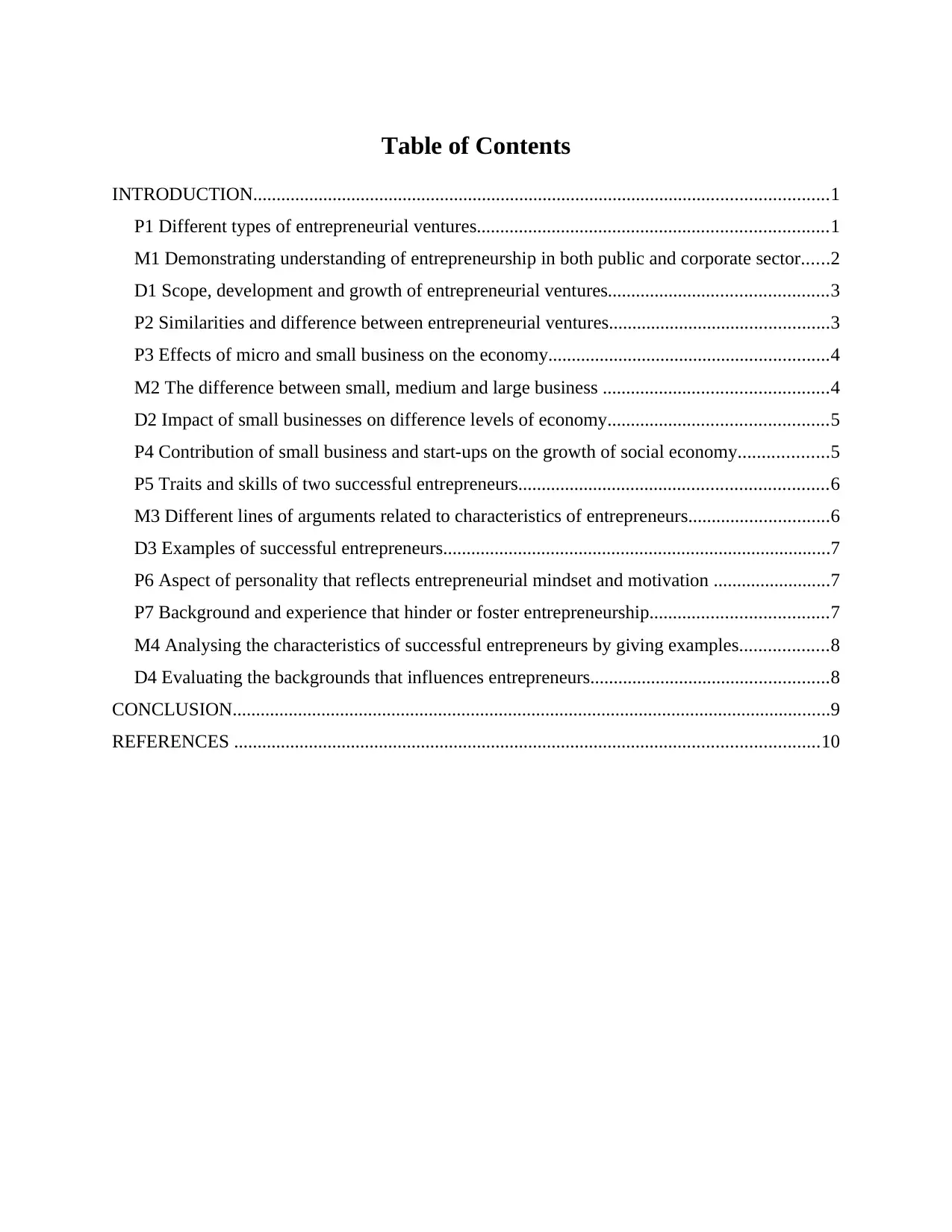
Table of Contents
INTRODUCTION...........................................................................................................................1
P1 Different types of entrepreneurial ventures...........................................................................1
M1 Demonstrating understanding of entrepreneurship in both public and corporate sector......2
D1 Scope, development and growth of entrepreneurial ventures...............................................3
P2 Similarities and difference between entrepreneurial ventures...............................................3
P3 Effects of micro and small business on the economy............................................................4
M2 The difference between small, medium and large business ................................................4
D2 Impact of small businesses on difference levels of economy...............................................5
P4 Contribution of small business and start-ups on the growth of social economy...................5
P5 Traits and skills of two successful entrepreneurs..................................................................6
M3 Different lines of arguments related to characteristics of entrepreneurs..............................6
D3 Examples of successful entrepreneurs...................................................................................7
P6 Aspect of personality that reflects entrepreneurial mindset and motivation .........................7
P7 Background and experience that hinder or foster entrepreneurship......................................7
M4 Analysing the characteristics of successful entrepreneurs by giving examples...................8
D4 Evaluating the backgrounds that influences entrepreneurs...................................................8
CONCLUSION................................................................................................................................9
REFERENCES .............................................................................................................................10
INTRODUCTION...........................................................................................................................1
P1 Different types of entrepreneurial ventures...........................................................................1
M1 Demonstrating understanding of entrepreneurship in both public and corporate sector......2
D1 Scope, development and growth of entrepreneurial ventures...............................................3
P2 Similarities and difference between entrepreneurial ventures...............................................3
P3 Effects of micro and small business on the economy............................................................4
M2 The difference between small, medium and large business ................................................4
D2 Impact of small businesses on difference levels of economy...............................................5
P4 Contribution of small business and start-ups on the growth of social economy...................5
P5 Traits and skills of two successful entrepreneurs..................................................................6
M3 Different lines of arguments related to characteristics of entrepreneurs..............................6
D3 Examples of successful entrepreneurs...................................................................................7
P6 Aspect of personality that reflects entrepreneurial mindset and motivation .........................7
P7 Background and experience that hinder or foster entrepreneurship......................................7
M4 Analysing the characteristics of successful entrepreneurs by giving examples...................8
D4 Evaluating the backgrounds that influences entrepreneurs...................................................8
CONCLUSION................................................................................................................................9
REFERENCES .............................................................................................................................10
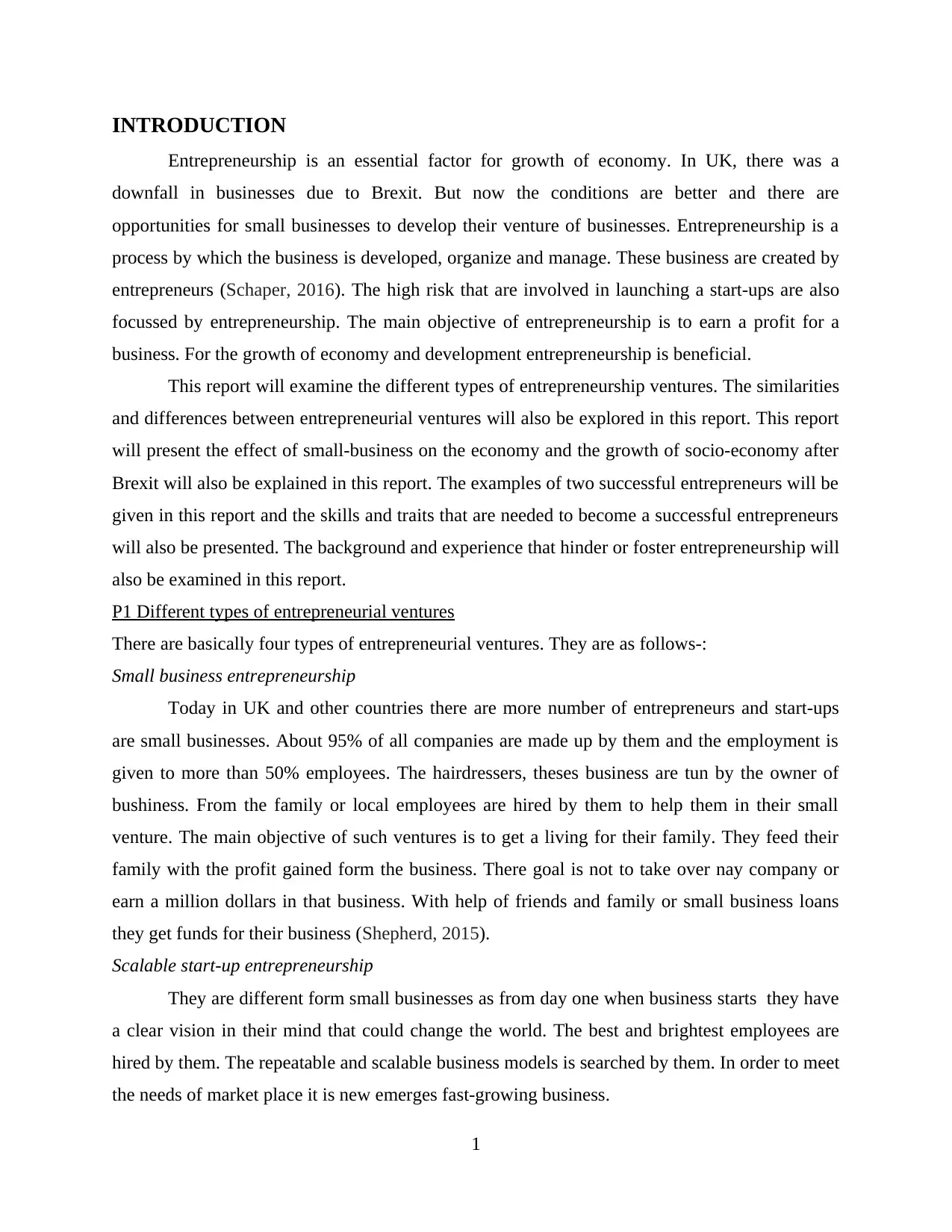
INTRODUCTION
Entrepreneurship is an essential factor for growth of economy. In UK, there was a
downfall in businesses due to Brexit. But now the conditions are better and there are
opportunities for small businesses to develop their venture of businesses. Entrepreneurship is a
process by which the business is developed, organize and manage. These business are created by
entrepreneurs (Schaper, 2016). The high risk that are involved in launching a start-ups are also
focussed by entrepreneurship. The main objective of entrepreneurship is to earn a profit for a
business. For the growth of economy and development entrepreneurship is beneficial.
This report will examine the different types of entrepreneurship ventures. The similarities
and differences between entrepreneurial ventures will also be explored in this report. This report
will present the effect of small-business on the economy and the growth of socio-economy after
Brexit will also be explained in this report. The examples of two successful entrepreneurs will be
given in this report and the skills and traits that are needed to become a successful entrepreneurs
will also be presented. The background and experience that hinder or foster entrepreneurship will
also be examined in this report.
P1 Different types of entrepreneurial ventures
There are basically four types of entrepreneurial ventures. They are as follows-:
Small business entrepreneurship
Today in UK and other countries there are more number of entrepreneurs and start-ups
are small businesses. About 95% of all companies are made up by them and the employment is
given to more than 50% employees. The hairdressers, theses business are tun by the owner of
bushiness. From the family or local employees are hired by them to help them in their small
venture. The main objective of such ventures is to get a living for their family. They feed their
family with the profit gained form the business. There goal is not to take over nay company or
earn a million dollars in that business. With help of friends and family or small business loans
they get funds for their business (Shepherd, 2015).
Scalable start-up entrepreneurship
They are different form small businesses as from day one when business starts they have
a clear vision in their mind that could change the world. The best and brightest employees are
hired by them. The repeatable and scalable business models is searched by them. In order to meet
the needs of market place it is new emerges fast-growing business.
1
Entrepreneurship is an essential factor for growth of economy. In UK, there was a
downfall in businesses due to Brexit. But now the conditions are better and there are
opportunities for small businesses to develop their venture of businesses. Entrepreneurship is a
process by which the business is developed, organize and manage. These business are created by
entrepreneurs (Schaper, 2016). The high risk that are involved in launching a start-ups are also
focussed by entrepreneurship. The main objective of entrepreneurship is to earn a profit for a
business. For the growth of economy and development entrepreneurship is beneficial.
This report will examine the different types of entrepreneurship ventures. The similarities
and differences between entrepreneurial ventures will also be explored in this report. This report
will present the effect of small-business on the economy and the growth of socio-economy after
Brexit will also be explained in this report. The examples of two successful entrepreneurs will be
given in this report and the skills and traits that are needed to become a successful entrepreneurs
will also be presented. The background and experience that hinder or foster entrepreneurship will
also be examined in this report.
P1 Different types of entrepreneurial ventures
There are basically four types of entrepreneurial ventures. They are as follows-:
Small business entrepreneurship
Today in UK and other countries there are more number of entrepreneurs and start-ups
are small businesses. About 95% of all companies are made up by them and the employment is
given to more than 50% employees. The hairdressers, theses business are tun by the owner of
bushiness. From the family or local employees are hired by them to help them in their small
venture. The main objective of such ventures is to get a living for their family. They feed their
family with the profit gained form the business. There goal is not to take over nay company or
earn a million dollars in that business. With help of friends and family or small business loans
they get funds for their business (Shepherd, 2015).
Scalable start-up entrepreneurship
They are different form small businesses as from day one when business starts they have
a clear vision in their mind that could change the world. The best and brightest employees are
hired by them. The repeatable and scalable business models is searched by them. In order to meet
the needs of market place it is new emerges fast-growing business.
1
⊘ This is a preview!⊘
Do you want full access?
Subscribe today to unlock all pages.

Trusted by 1+ million students worldwide
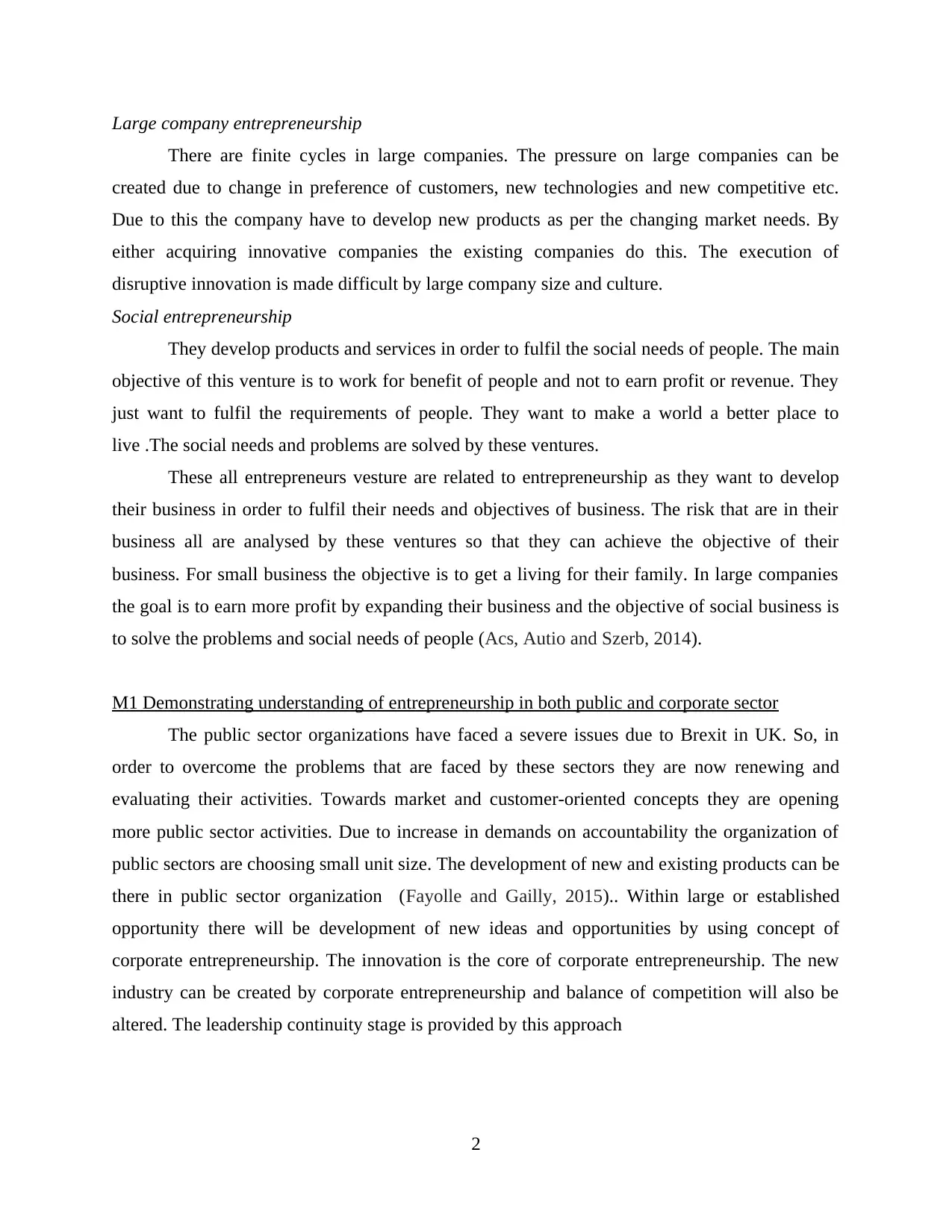
Large company entrepreneurship
There are finite cycles in large companies. The pressure on large companies can be
created due to change in preference of customers, new technologies and new competitive etc.
Due to this the company have to develop new products as per the changing market needs. By
either acquiring innovative companies the existing companies do this. The execution of
disruptive innovation is made difficult by large company size and culture.
Social entrepreneurship
They develop products and services in order to fulfil the social needs of people. The main
objective of this venture is to work for benefit of people and not to earn profit or revenue. They
just want to fulfil the requirements of people. They want to make a world a better place to
live .The social needs and problems are solved by these ventures.
These all entrepreneurs vesture are related to entrepreneurship as they want to develop
their business in order to fulfil their needs and objectives of business. The risk that are in their
business all are analysed by these ventures so that they can achieve the objective of their
business. For small business the objective is to get a living for their family. In large companies
the goal is to earn more profit by expanding their business and the objective of social business is
to solve the problems and social needs of people (Acs, Autio and Szerb, 2014).
M1 Demonstrating understanding of entrepreneurship in both public and corporate sector
The public sector organizations have faced a severe issues due to Brexit in UK. So, in
order to overcome the problems that are faced by these sectors they are now renewing and
evaluating their activities. Towards market and customer-oriented concepts they are opening
more public sector activities. Due to increase in demands on accountability the organization of
public sectors are choosing small unit size. The development of new and existing products can be
there in public sector organization (Fayolle and Gailly, 2015).. Within large or established
opportunity there will be development of new ideas and opportunities by using concept of
corporate entrepreneurship. The innovation is the core of corporate entrepreneurship. The new
industry can be created by corporate entrepreneurship and balance of competition will also be
altered. The leadership continuity stage is provided by this approach
2
There are finite cycles in large companies. The pressure on large companies can be
created due to change in preference of customers, new technologies and new competitive etc.
Due to this the company have to develop new products as per the changing market needs. By
either acquiring innovative companies the existing companies do this. The execution of
disruptive innovation is made difficult by large company size and culture.
Social entrepreneurship
They develop products and services in order to fulfil the social needs of people. The main
objective of this venture is to work for benefit of people and not to earn profit or revenue. They
just want to fulfil the requirements of people. They want to make a world a better place to
live .The social needs and problems are solved by these ventures.
These all entrepreneurs vesture are related to entrepreneurship as they want to develop
their business in order to fulfil their needs and objectives of business. The risk that are in their
business all are analysed by these ventures so that they can achieve the objective of their
business. For small business the objective is to get a living for their family. In large companies
the goal is to earn more profit by expanding their business and the objective of social business is
to solve the problems and social needs of people (Acs, Autio and Szerb, 2014).
M1 Demonstrating understanding of entrepreneurship in both public and corporate sector
The public sector organizations have faced a severe issues due to Brexit in UK. So, in
order to overcome the problems that are faced by these sectors they are now renewing and
evaluating their activities. Towards market and customer-oriented concepts they are opening
more public sector activities. Due to increase in demands on accountability the organization of
public sectors are choosing small unit size. The development of new and existing products can be
there in public sector organization (Fayolle and Gailly, 2015).. Within large or established
opportunity there will be development of new ideas and opportunities by using concept of
corporate entrepreneurship. The innovation is the core of corporate entrepreneurship. The new
industry can be created by corporate entrepreneurship and balance of competition will also be
altered. The leadership continuity stage is provided by this approach
2
Paraphrase This Document
Need a fresh take? Get an instant paraphrase of this document with our AI Paraphraser
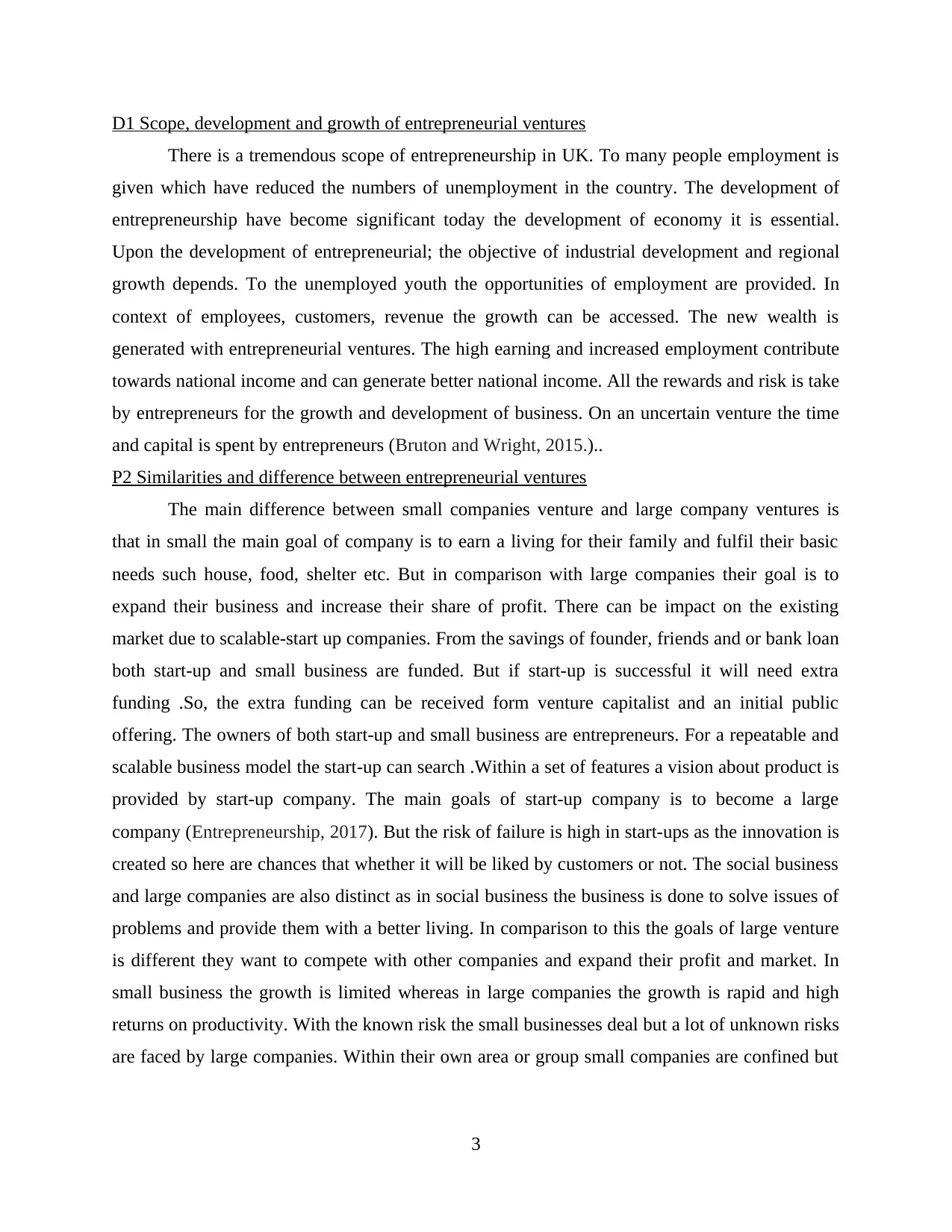
D1 Scope, development and growth of entrepreneurial ventures
There is a tremendous scope of entrepreneurship in UK. To many people employment is
given which have reduced the numbers of unemployment in the country. The development of
entrepreneurship have become significant today the development of economy it is essential.
Upon the development of entrepreneurial; the objective of industrial development and regional
growth depends. To the unemployed youth the opportunities of employment are provided. In
context of employees, customers, revenue the growth can be accessed. The new wealth is
generated with entrepreneurial ventures. The high earning and increased employment contribute
towards national income and can generate better national income. All the rewards and risk is take
by entrepreneurs for the growth and development of business. On an uncertain venture the time
and capital is spent by entrepreneurs (Bruton and Wright, 2015.)..
P2 Similarities and difference between entrepreneurial ventures
The main difference between small companies venture and large company ventures is
that in small the main goal of company is to earn a living for their family and fulfil their basic
needs such house, food, shelter etc. But in comparison with large companies their goal is to
expand their business and increase their share of profit. There can be impact on the existing
market due to scalable-start up companies. From the savings of founder, friends and or bank loan
both start-up and small business are funded. But if start-up is successful it will need extra
funding .So, the extra funding can be received form venture capitalist and an initial public
offering. The owners of both start-up and small business are entrepreneurs. For a repeatable and
scalable business model the start-up can search .Within a set of features a vision about product is
provided by start-up company. The main goals of start-up company is to become a large
company (Entrepreneurship, 2017). But the risk of failure is high in start-ups as the innovation is
created so here are chances that whether it will be liked by customers or not. The social business
and large companies are also distinct as in social business the business is done to solve issues of
problems and provide them with a better living. In comparison to this the goals of large venture
is different they want to compete with other companies and expand their profit and market. In
small business the growth is limited whereas in large companies the growth is rapid and high
returns on productivity. With the known risk the small businesses deal but a lot of unknown risks
are faced by large companies. Within their own area or group small companies are confined but
3
There is a tremendous scope of entrepreneurship in UK. To many people employment is
given which have reduced the numbers of unemployment in the country. The development of
entrepreneurship have become significant today the development of economy it is essential.
Upon the development of entrepreneurial; the objective of industrial development and regional
growth depends. To the unemployed youth the opportunities of employment are provided. In
context of employees, customers, revenue the growth can be accessed. The new wealth is
generated with entrepreneurial ventures. The high earning and increased employment contribute
towards national income and can generate better national income. All the rewards and risk is take
by entrepreneurs for the growth and development of business. On an uncertain venture the time
and capital is spent by entrepreneurs (Bruton and Wright, 2015.)..
P2 Similarities and difference between entrepreneurial ventures
The main difference between small companies venture and large company ventures is
that in small the main goal of company is to earn a living for their family and fulfil their basic
needs such house, food, shelter etc. But in comparison with large companies their goal is to
expand their business and increase their share of profit. There can be impact on the existing
market due to scalable-start up companies. From the savings of founder, friends and or bank loan
both start-up and small business are funded. But if start-up is successful it will need extra
funding .So, the extra funding can be received form venture capitalist and an initial public
offering. The owners of both start-up and small business are entrepreneurs. For a repeatable and
scalable business model the start-up can search .Within a set of features a vision about product is
provided by start-up company. The main goals of start-up company is to become a large
company (Entrepreneurship, 2017). But the risk of failure is high in start-ups as the innovation is
created so here are chances that whether it will be liked by customers or not. The social business
and large companies are also distinct as in social business the business is done to solve issues of
problems and provide them with a better living. In comparison to this the goals of large venture
is different they want to compete with other companies and expand their profit and market. In
small business the growth is limited whereas in large companies the growth is rapid and high
returns on productivity. With the known risk the small businesses deal but a lot of unknown risks
are faced by large companies. Within their own area or group small companies are confined but
3
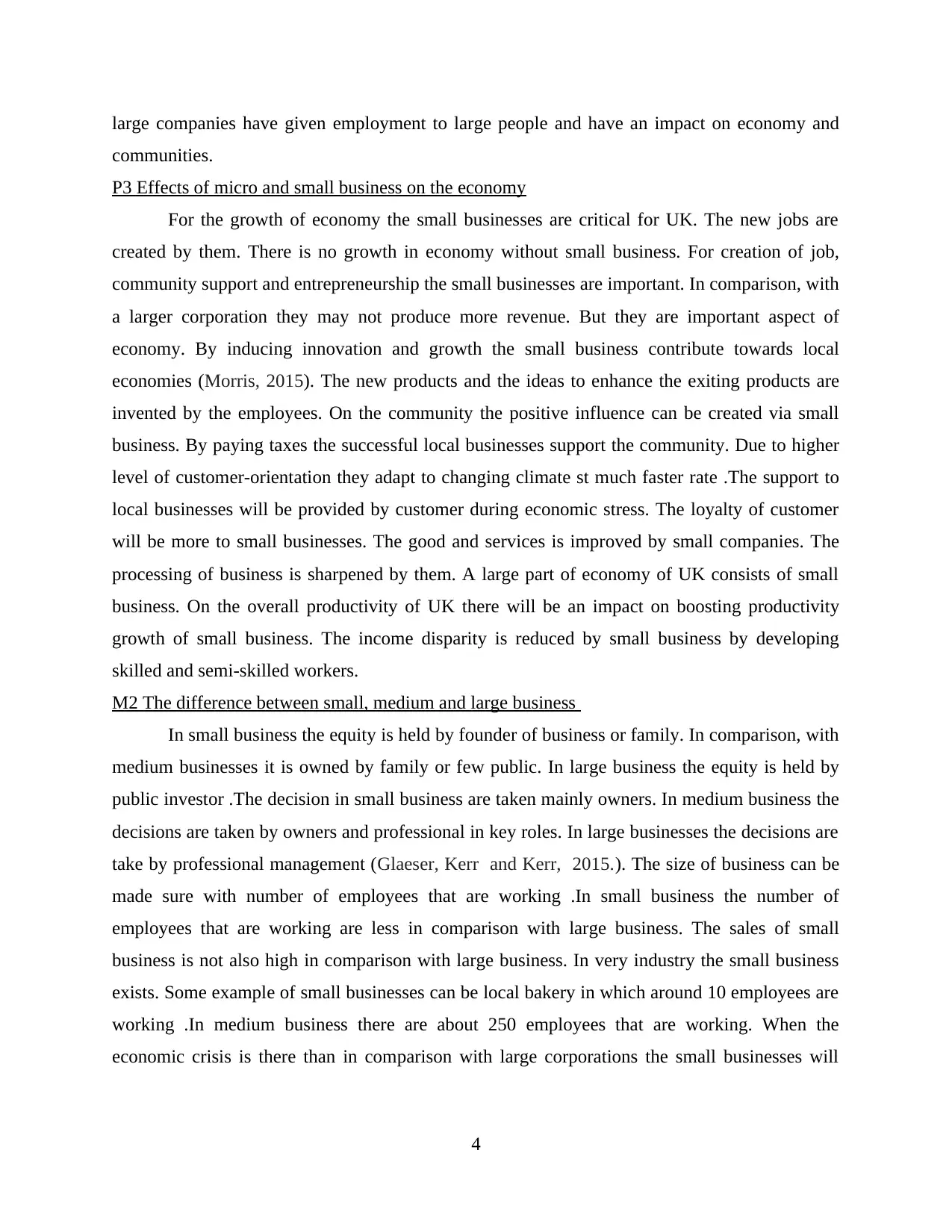
large companies have given employment to large people and have an impact on economy and
communities.
P3 Effects of micro and small business on the economy
For the growth of economy the small businesses are critical for UK. The new jobs are
created by them. There is no growth in economy without small business. For creation of job,
community support and entrepreneurship the small businesses are important. In comparison, with
a larger corporation they may not produce more revenue. But they are important aspect of
economy. By inducing innovation and growth the small business contribute towards local
economies (Morris, 2015). The new products and the ideas to enhance the exiting products are
invented by the employees. On the community the positive influence can be created via small
business. By paying taxes the successful local businesses support the community. Due to higher
level of customer-orientation they adapt to changing climate st much faster rate .The support to
local businesses will be provided by customer during economic stress. The loyalty of customer
will be more to small businesses. The good and services is improved by small companies. The
processing of business is sharpened by them. A large part of economy of UK consists of small
business. On the overall productivity of UK there will be an impact on boosting productivity
growth of small business. The income disparity is reduced by small business by developing
skilled and semi-skilled workers.
M2 The difference between small, medium and large business
In small business the equity is held by founder of business or family. In comparison, with
medium businesses it is owned by family or few public. In large business the equity is held by
public investor .The decision in small business are taken mainly owners. In medium business the
decisions are taken by owners and professional in key roles. In large businesses the decisions are
take by professional management (Glaeser, Kerr and Kerr, 2015.). The size of business can be
made sure with number of employees that are working .In small business the number of
employees that are working are less in comparison with large business. The sales of small
business is not also high in comparison with large business. In very industry the small business
exists. Some example of small businesses can be local bakery in which around 10 employees are
working .In medium business there are about 250 employees that are working. When the
economic crisis is there than in comparison with large corporations the small businesses will
4
communities.
P3 Effects of micro and small business on the economy
For the growth of economy the small businesses are critical for UK. The new jobs are
created by them. There is no growth in economy without small business. For creation of job,
community support and entrepreneurship the small businesses are important. In comparison, with
a larger corporation they may not produce more revenue. But they are important aspect of
economy. By inducing innovation and growth the small business contribute towards local
economies (Morris, 2015). The new products and the ideas to enhance the exiting products are
invented by the employees. On the community the positive influence can be created via small
business. By paying taxes the successful local businesses support the community. Due to higher
level of customer-orientation they adapt to changing climate st much faster rate .The support to
local businesses will be provided by customer during economic stress. The loyalty of customer
will be more to small businesses. The good and services is improved by small companies. The
processing of business is sharpened by them. A large part of economy of UK consists of small
business. On the overall productivity of UK there will be an impact on boosting productivity
growth of small business. The income disparity is reduced by small business by developing
skilled and semi-skilled workers.
M2 The difference between small, medium and large business
In small business the equity is held by founder of business or family. In comparison, with
medium businesses it is owned by family or few public. In large business the equity is held by
public investor .The decision in small business are taken mainly owners. In medium business the
decisions are taken by owners and professional in key roles. In large businesses the decisions are
take by professional management (Glaeser, Kerr and Kerr, 2015.). The size of business can be
made sure with number of employees that are working .In small business the number of
employees that are working are less in comparison with large business. The sales of small
business is not also high in comparison with large business. In very industry the small business
exists. Some example of small businesses can be local bakery in which around 10 employees are
working .In medium business there are about 250 employees that are working. When the
economic crisis is there than in comparison with large corporations the small businesses will
4
⊘ This is a preview!⊘
Do you want full access?
Subscribe today to unlock all pages.

Trusted by 1+ million students worldwide
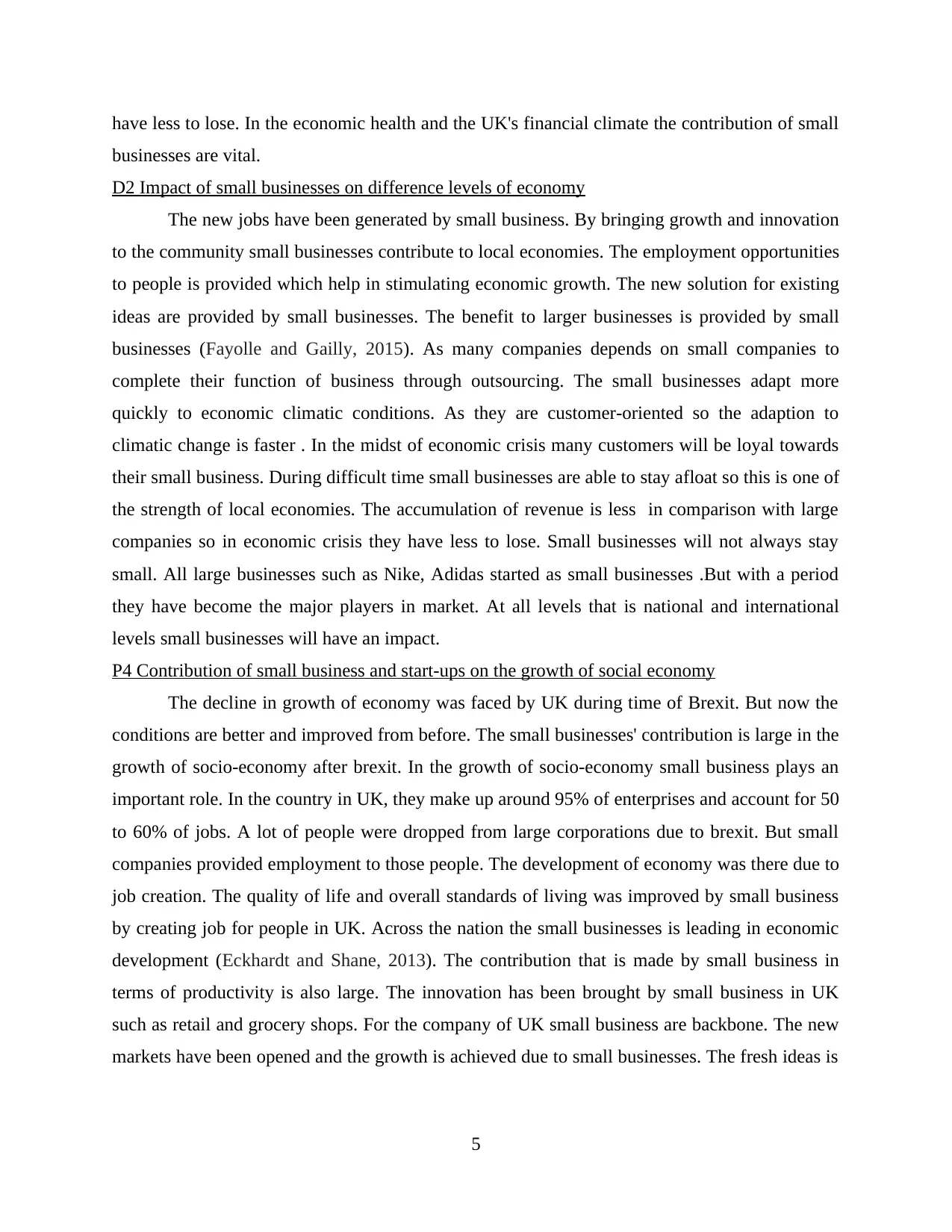
have less to lose. In the economic health and the UK's financial climate the contribution of small
businesses are vital.
D2 Impact of small businesses on difference levels of economy
The new jobs have been generated by small business. By bringing growth and innovation
to the community small businesses contribute to local economies. The employment opportunities
to people is provided which help in stimulating economic growth. The new solution for existing
ideas are provided by small businesses. The benefit to larger businesses is provided by small
businesses (Fayolle and Gailly, 2015). As many companies depends on small companies to
complete their function of business through outsourcing. The small businesses adapt more
quickly to economic climatic conditions. As they are customer-oriented so the adaption to
climatic change is faster . In the midst of economic crisis many customers will be loyal towards
their small business. During difficult time small businesses are able to stay afloat so this is one of
the strength of local economies. The accumulation of revenue is less in comparison with large
companies so in economic crisis they have less to lose. Small businesses will not always stay
small. All large businesses such as Nike, Adidas started as small businesses .But with a period
they have become the major players in market. At all levels that is national and international
levels small businesses will have an impact.
P4 Contribution of small business and start-ups on the growth of social economy
The decline in growth of economy was faced by UK during time of Brexit. But now the
conditions are better and improved from before. The small businesses' contribution is large in the
growth of socio-economy after brexit. In the growth of socio-economy small business plays an
important role. In the country in UK, they make up around 95% of enterprises and account for 50
to 60% of jobs. A lot of people were dropped from large corporations due to brexit. But small
companies provided employment to those people. The development of economy was there due to
job creation. The quality of life and overall standards of living was improved by small business
by creating job for people in UK. Across the nation the small businesses is leading in economic
development (Eckhardt and Shane, 2013). The contribution that is made by small business in
terms of productivity is also large. The innovation has been brought by small business in UK
such as retail and grocery shops. For the company of UK small business are backbone. The new
markets have been opened and the growth is achieved due to small businesses. The fresh ideas is
5
businesses are vital.
D2 Impact of small businesses on difference levels of economy
The new jobs have been generated by small business. By bringing growth and innovation
to the community small businesses contribute to local economies. The employment opportunities
to people is provided which help in stimulating economic growth. The new solution for existing
ideas are provided by small businesses. The benefit to larger businesses is provided by small
businesses (Fayolle and Gailly, 2015). As many companies depends on small companies to
complete their function of business through outsourcing. The small businesses adapt more
quickly to economic climatic conditions. As they are customer-oriented so the adaption to
climatic change is faster . In the midst of economic crisis many customers will be loyal towards
their small business. During difficult time small businesses are able to stay afloat so this is one of
the strength of local economies. The accumulation of revenue is less in comparison with large
companies so in economic crisis they have less to lose. Small businesses will not always stay
small. All large businesses such as Nike, Adidas started as small businesses .But with a period
they have become the major players in market. At all levels that is national and international
levels small businesses will have an impact.
P4 Contribution of small business and start-ups on the growth of social economy
The decline in growth of economy was faced by UK during time of Brexit. But now the
conditions are better and improved from before. The small businesses' contribution is large in the
growth of socio-economy after brexit. In the growth of socio-economy small business plays an
important role. In the country in UK, they make up around 95% of enterprises and account for 50
to 60% of jobs. A lot of people were dropped from large corporations due to brexit. But small
companies provided employment to those people. The development of economy was there due to
job creation. The quality of life and overall standards of living was improved by small business
by creating job for people in UK. Across the nation the small businesses is leading in economic
development (Eckhardt and Shane, 2013). The contribution that is made by small business in
terms of productivity is also large. The innovation has been brought by small business in UK
such as retail and grocery shops. For the company of UK small business are backbone. The new
markets have been opened and the growth is achieved due to small businesses. The fresh ideas is
5
Paraphrase This Document
Need a fresh take? Get an instant paraphrase of this document with our AI Paraphraser
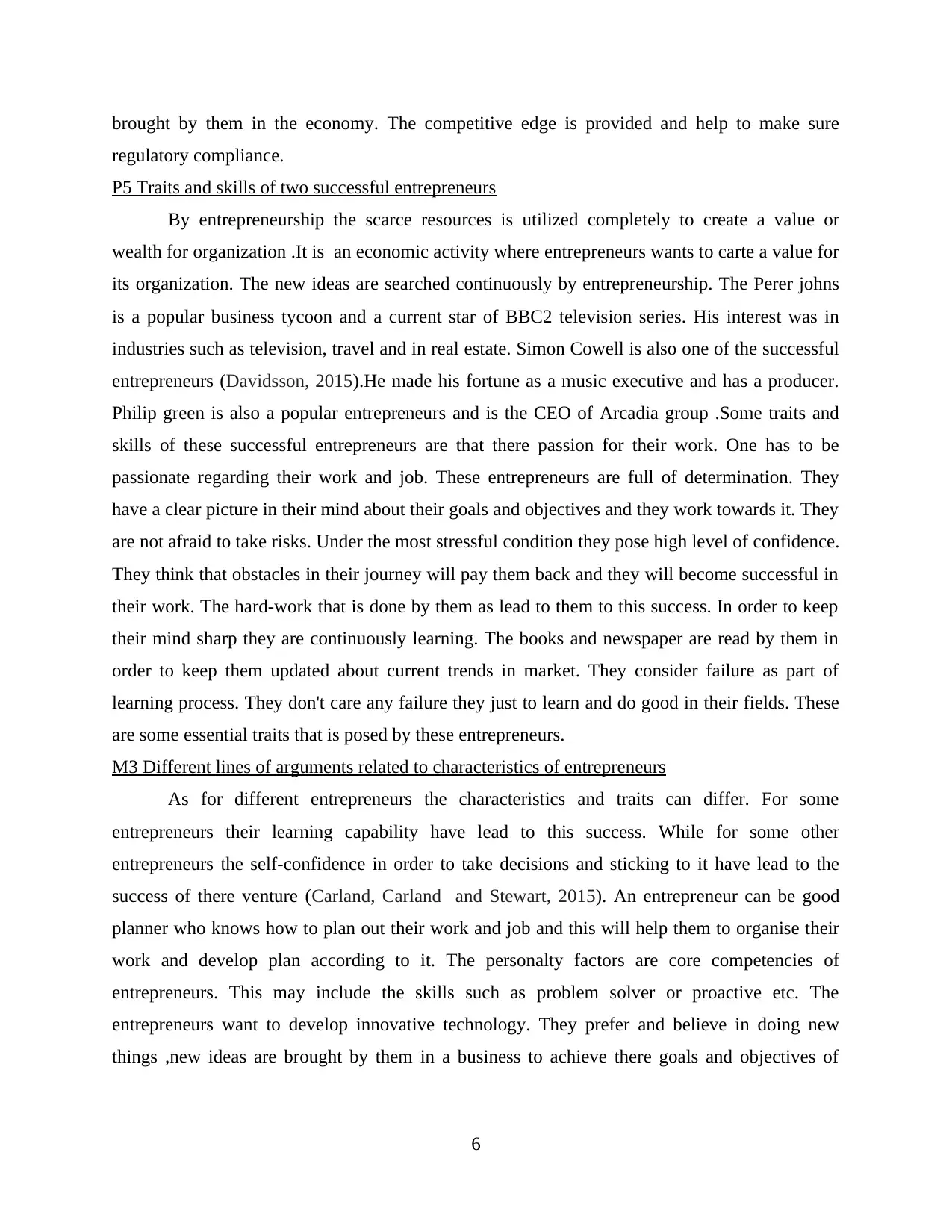
brought by them in the economy. The competitive edge is provided and help to make sure
regulatory compliance.
P5 Traits and skills of two successful entrepreneurs
By entrepreneurship the scarce resources is utilized completely to create a value or
wealth for organization .It is an economic activity where entrepreneurs wants to carte a value for
its organization. The new ideas are searched continuously by entrepreneurship. The Perer johns
is a popular business tycoon and a current star of BBC2 television series. His interest was in
industries such as television, travel and in real estate. Simon Cowell is also one of the successful
entrepreneurs (Davidsson, 2015).He made his fortune as a music executive and has a producer.
Philip green is also a popular entrepreneurs and is the CEO of Arcadia group .Some traits and
skills of these successful entrepreneurs are that there passion for their work. One has to be
passionate regarding their work and job. These entrepreneurs are full of determination. They
have a clear picture in their mind about their goals and objectives and they work towards it. They
are not afraid to take risks. Under the most stressful condition they pose high level of confidence.
They think that obstacles in their journey will pay them back and they will become successful in
their work. The hard-work that is done by them as lead to them to this success. In order to keep
their mind sharp they are continuously learning. The books and newspaper are read by them in
order to keep them updated about current trends in market. They consider failure as part of
learning process. They don't care any failure they just to learn and do good in their fields. These
are some essential traits that is posed by these entrepreneurs.
M3 Different lines of arguments related to characteristics of entrepreneurs
As for different entrepreneurs the characteristics and traits can differ. For some
entrepreneurs their learning capability have lead to this success. While for some other
entrepreneurs the self-confidence in order to take decisions and sticking to it have lead to the
success of there venture (Carland, Carland and Stewart, 2015). An entrepreneur can be good
planner who knows how to plan out their work and job and this will help them to organise their
work and develop plan according to it. The personalty factors are core competencies of
entrepreneurs. This may include the skills such as problem solver or proactive etc. The
entrepreneurs want to develop innovative technology. They prefer and believe in doing new
things ,new ideas are brought by them in a business to achieve there goals and objectives of
6
regulatory compliance.
P5 Traits and skills of two successful entrepreneurs
By entrepreneurship the scarce resources is utilized completely to create a value or
wealth for organization .It is an economic activity where entrepreneurs wants to carte a value for
its organization. The new ideas are searched continuously by entrepreneurship. The Perer johns
is a popular business tycoon and a current star of BBC2 television series. His interest was in
industries such as television, travel and in real estate. Simon Cowell is also one of the successful
entrepreneurs (Davidsson, 2015).He made his fortune as a music executive and has a producer.
Philip green is also a popular entrepreneurs and is the CEO of Arcadia group .Some traits and
skills of these successful entrepreneurs are that there passion for their work. One has to be
passionate regarding their work and job. These entrepreneurs are full of determination. They
have a clear picture in their mind about their goals and objectives and they work towards it. They
are not afraid to take risks. Under the most stressful condition they pose high level of confidence.
They think that obstacles in their journey will pay them back and they will become successful in
their work. The hard-work that is done by them as lead to them to this success. In order to keep
their mind sharp they are continuously learning. The books and newspaper are read by them in
order to keep them updated about current trends in market. They consider failure as part of
learning process. They don't care any failure they just to learn and do good in their fields. These
are some essential traits that is posed by these entrepreneurs.
M3 Different lines of arguments related to characteristics of entrepreneurs
As for different entrepreneurs the characteristics and traits can differ. For some
entrepreneurs their learning capability have lead to this success. While for some other
entrepreneurs the self-confidence in order to take decisions and sticking to it have lead to the
success of there venture (Carland, Carland and Stewart, 2015). An entrepreneur can be good
planner who knows how to plan out their work and job and this will help them to organise their
work and develop plan according to it. The personalty factors are core competencies of
entrepreneurs. This may include the skills such as problem solver or proactive etc. The
entrepreneurs want to develop innovative technology. They prefer and believe in doing new
things ,new ideas are brought by them in a business to achieve there goals and objectives of
6
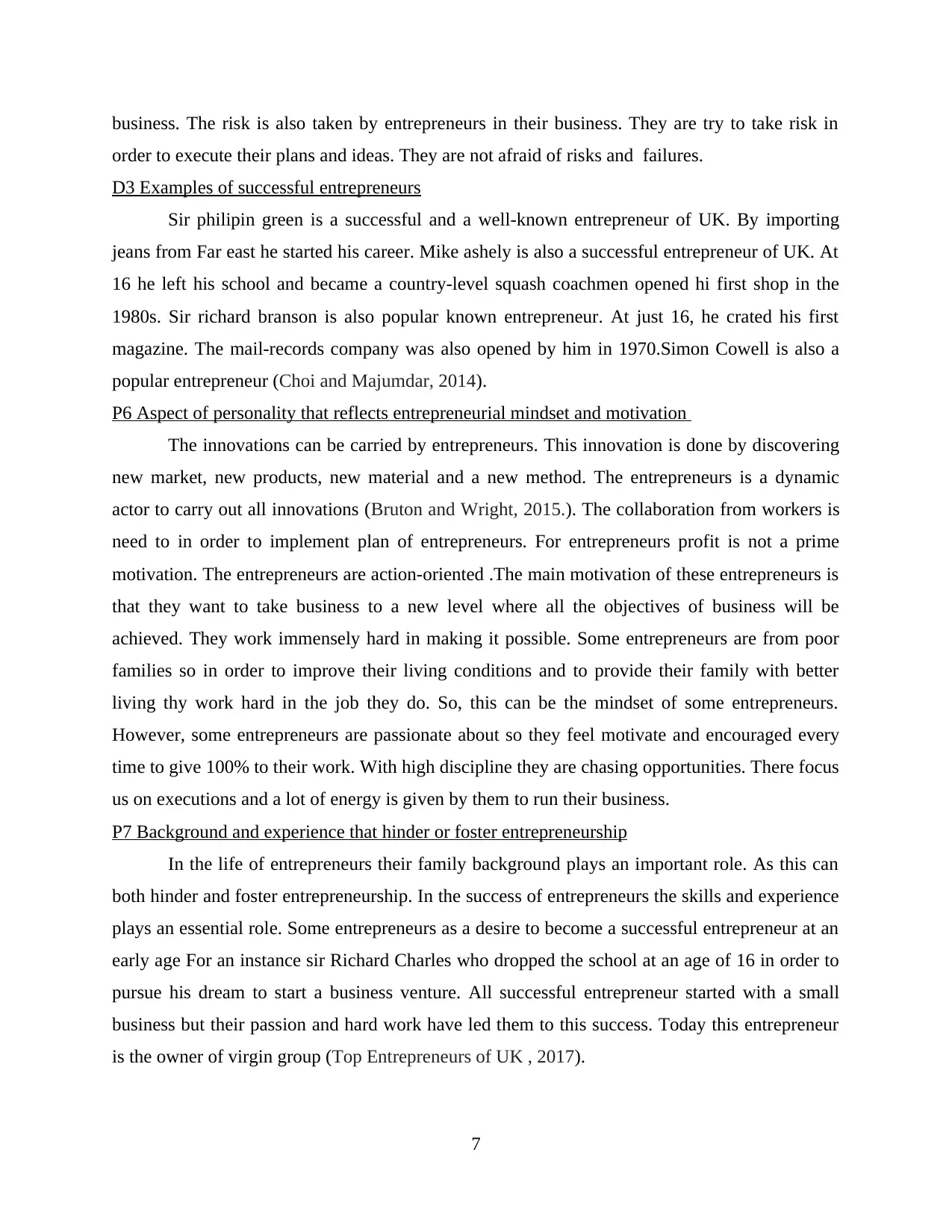
business. The risk is also taken by entrepreneurs in their business. They are try to take risk in
order to execute their plans and ideas. They are not afraid of risks and failures.
D3 Examples of successful entrepreneurs
Sir philipin green is a successful and a well-known entrepreneur of UK. By importing
jeans from Far east he started his career. Mike ashely is also a successful entrepreneur of UK. At
16 he left his school and became a country-level squash coachmen opened hi first shop in the
1980s. Sir richard branson is also popular known entrepreneur. At just 16, he crated his first
magazine. The mail-records company was also opened by him in 1970.Simon Cowell is also a
popular entrepreneur (Choi and Majumdar, 2014).
P6 Aspect of personality that reflects entrepreneurial mindset and motivation
The innovations can be carried by entrepreneurs. This innovation is done by discovering
new market, new products, new material and a new method. The entrepreneurs is a dynamic
actor to carry out all innovations (Bruton and Wright, 2015.). The collaboration from workers is
need to in order to implement plan of entrepreneurs. For entrepreneurs profit is not a prime
motivation. The entrepreneurs are action-oriented .The main motivation of these entrepreneurs is
that they want to take business to a new level where all the objectives of business will be
achieved. They work immensely hard in making it possible. Some entrepreneurs are from poor
families so in order to improve their living conditions and to provide their family with better
living thy work hard in the job they do. So, this can be the mindset of some entrepreneurs.
However, some entrepreneurs are passionate about so they feel motivate and encouraged every
time to give 100% to their work. With high discipline they are chasing opportunities. There focus
us on executions and a lot of energy is given by them to run their business.
P7 Background and experience that hinder or foster entrepreneurship
In the life of entrepreneurs their family background plays an important role. As this can
both hinder and foster entrepreneurship. In the success of entrepreneurs the skills and experience
plays an essential role. Some entrepreneurs as a desire to become a successful entrepreneur at an
early age For an instance sir Richard Charles who dropped the school at an age of 16 in order to
pursue his dream to start a business venture. All successful entrepreneur started with a small
business but their passion and hard work have led them to this success. Today this entrepreneur
is the owner of virgin group (Top Entrepreneurs of UK , 2017).
7
order to execute their plans and ideas. They are not afraid of risks and failures.
D3 Examples of successful entrepreneurs
Sir philipin green is a successful and a well-known entrepreneur of UK. By importing
jeans from Far east he started his career. Mike ashely is also a successful entrepreneur of UK. At
16 he left his school and became a country-level squash coachmen opened hi first shop in the
1980s. Sir richard branson is also popular known entrepreneur. At just 16, he crated his first
magazine. The mail-records company was also opened by him in 1970.Simon Cowell is also a
popular entrepreneur (Choi and Majumdar, 2014).
P6 Aspect of personality that reflects entrepreneurial mindset and motivation
The innovations can be carried by entrepreneurs. This innovation is done by discovering
new market, new products, new material and a new method. The entrepreneurs is a dynamic
actor to carry out all innovations (Bruton and Wright, 2015.). The collaboration from workers is
need to in order to implement plan of entrepreneurs. For entrepreneurs profit is not a prime
motivation. The entrepreneurs are action-oriented .The main motivation of these entrepreneurs is
that they want to take business to a new level where all the objectives of business will be
achieved. They work immensely hard in making it possible. Some entrepreneurs are from poor
families so in order to improve their living conditions and to provide their family with better
living thy work hard in the job they do. So, this can be the mindset of some entrepreneurs.
However, some entrepreneurs are passionate about so they feel motivate and encouraged every
time to give 100% to their work. With high discipline they are chasing opportunities. There focus
us on executions and a lot of energy is given by them to run their business.
P7 Background and experience that hinder or foster entrepreneurship
In the life of entrepreneurs their family background plays an important role. As this can
both hinder and foster entrepreneurship. In the success of entrepreneurs the skills and experience
plays an essential role. Some entrepreneurs as a desire to become a successful entrepreneur at an
early age For an instance sir Richard Charles who dropped the school at an age of 16 in order to
pursue his dream to start a business venture. All successful entrepreneur started with a small
business but their passion and hard work have led them to this success. Today this entrepreneur
is the owner of virgin group (Top Entrepreneurs of UK , 2017).
7
⊘ This is a preview!⊘
Do you want full access?
Subscribe today to unlock all pages.

Trusted by 1+ million students worldwide
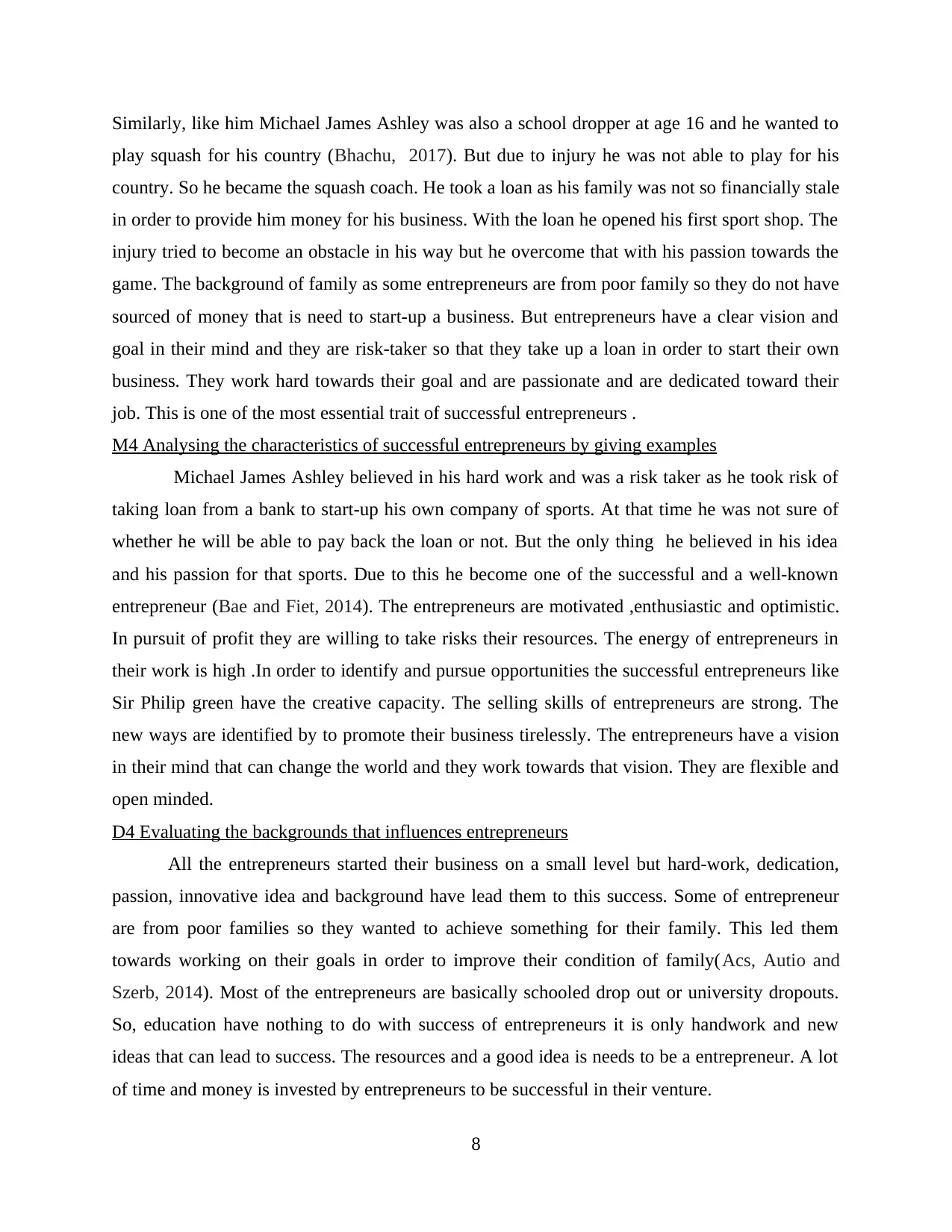
Similarly, like him Michael James Ashley was also a school dropper at age 16 and he wanted to
play squash for his country (Bhachu, 2017). But due to injury he was not able to play for his
country. So he became the squash coach. He took a loan as his family was not so financially stale
in order to provide him money for his business. With the loan he opened his first sport shop. The
injury tried to become an obstacle in his way but he overcome that with his passion towards the
game. The background of family as some entrepreneurs are from poor family so they do not have
sourced of money that is need to start-up a business. But entrepreneurs have a clear vision and
goal in their mind and they are risk-taker so that they take up a loan in order to start their own
business. They work hard towards their goal and are passionate and are dedicated toward their
job. This is one of the most essential trait of successful entrepreneurs .
M4 Analysing the characteristics of successful entrepreneurs by giving examples
Michael James Ashley believed in his hard work and was a risk taker as he took risk of
taking loan from a bank to start-up his own company of sports. At that time he was not sure of
whether he will be able to pay back the loan or not. But the only thing he believed in his idea
and his passion for that sports. Due to this he become one of the successful and a well-known
entrepreneur (Bae and Fiet, 2014). The entrepreneurs are motivated ,enthusiastic and optimistic.
In pursuit of profit they are willing to take risks their resources. The energy of entrepreneurs in
their work is high .In order to identify and pursue opportunities the successful entrepreneurs like
Sir Philip green have the creative capacity. The selling skills of entrepreneurs are strong. The
new ways are identified by to promote their business tirelessly. The entrepreneurs have a vision
in their mind that can change the world and they work towards that vision. They are flexible and
open minded.
D4 Evaluating the backgrounds that influences entrepreneurs
All the entrepreneurs started their business on a small level but hard-work, dedication,
passion, innovative idea and background have lead them to this success. Some of entrepreneur
are from poor families so they wanted to achieve something for their family. This led them
towards working on their goals in order to improve their condition of family(Acs, Autio and
Szerb, 2014). Most of the entrepreneurs are basically schooled drop out or university dropouts.
So, education have nothing to do with success of entrepreneurs it is only handwork and new
ideas that can lead to success. The resources and a good idea is needs to be a entrepreneur. A lot
of time and money is invested by entrepreneurs to be successful in their venture.
8
play squash for his country (Bhachu, 2017). But due to injury he was not able to play for his
country. So he became the squash coach. He took a loan as his family was not so financially stale
in order to provide him money for his business. With the loan he opened his first sport shop. The
injury tried to become an obstacle in his way but he overcome that with his passion towards the
game. The background of family as some entrepreneurs are from poor family so they do not have
sourced of money that is need to start-up a business. But entrepreneurs have a clear vision and
goal in their mind and they are risk-taker so that they take up a loan in order to start their own
business. They work hard towards their goal and are passionate and are dedicated toward their
job. This is one of the most essential trait of successful entrepreneurs .
M4 Analysing the characteristics of successful entrepreneurs by giving examples
Michael James Ashley believed in his hard work and was a risk taker as he took risk of
taking loan from a bank to start-up his own company of sports. At that time he was not sure of
whether he will be able to pay back the loan or not. But the only thing he believed in his idea
and his passion for that sports. Due to this he become one of the successful and a well-known
entrepreneur (Bae and Fiet, 2014). The entrepreneurs are motivated ,enthusiastic and optimistic.
In pursuit of profit they are willing to take risks their resources. The energy of entrepreneurs in
their work is high .In order to identify and pursue opportunities the successful entrepreneurs like
Sir Philip green have the creative capacity. The selling skills of entrepreneurs are strong. The
new ways are identified by to promote their business tirelessly. The entrepreneurs have a vision
in their mind that can change the world and they work towards that vision. They are flexible and
open minded.
D4 Evaluating the backgrounds that influences entrepreneurs
All the entrepreneurs started their business on a small level but hard-work, dedication,
passion, innovative idea and background have lead them to this success. Some of entrepreneur
are from poor families so they wanted to achieve something for their family. This led them
towards working on their goals in order to improve their condition of family(Acs, Autio and
Szerb, 2014). Most of the entrepreneurs are basically schooled drop out or university dropouts.
So, education have nothing to do with success of entrepreneurs it is only handwork and new
ideas that can lead to success. The resources and a good idea is needs to be a entrepreneur. A lot
of time and money is invested by entrepreneurs to be successful in their venture.
8
Paraphrase This Document
Need a fresh take? Get an instant paraphrase of this document with our AI Paraphraser
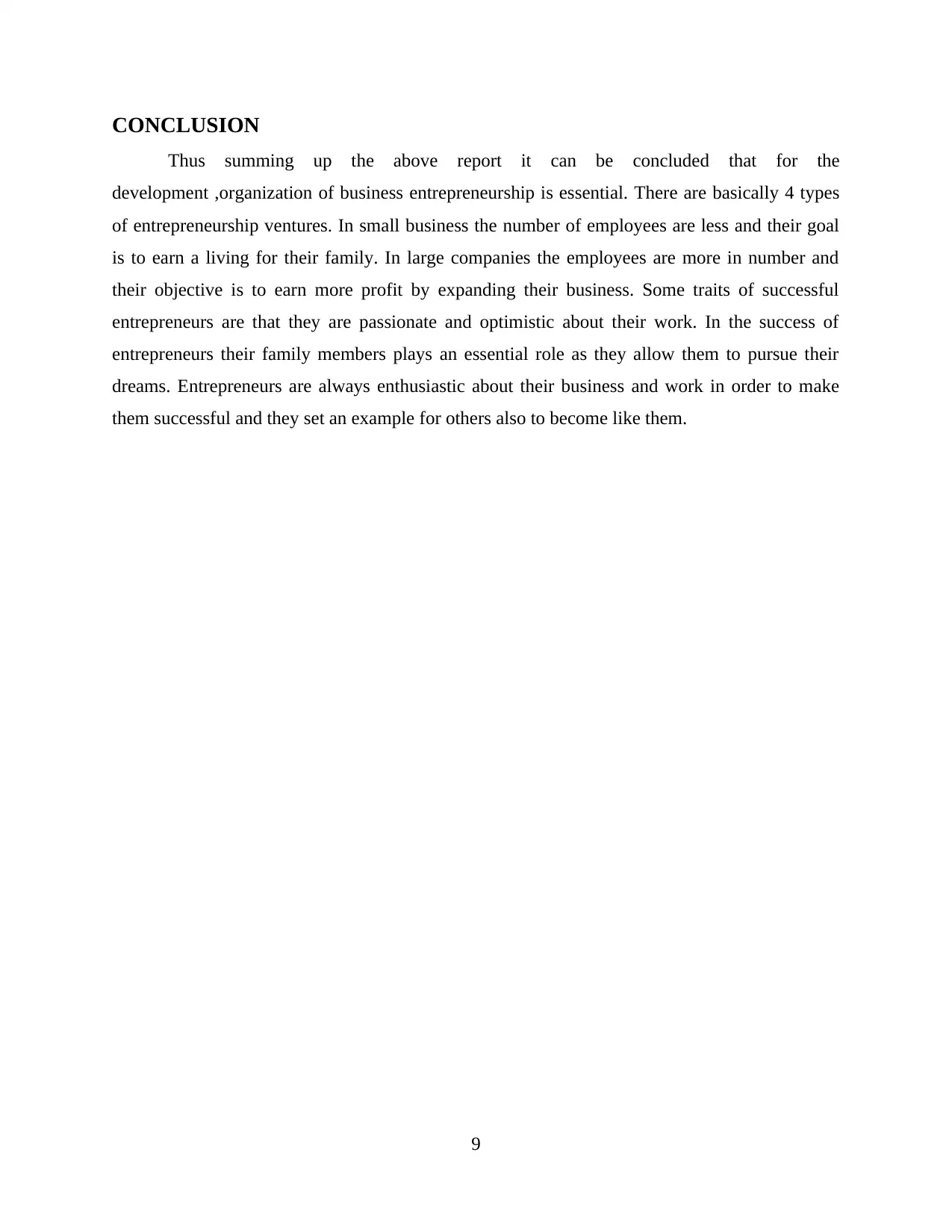
CONCLUSION
Thus summing up the above report it can be concluded that for the
development ,organization of business entrepreneurship is essential. There are basically 4 types
of entrepreneurship ventures. In small business the number of employees are less and their goal
is to earn a living for their family. In large companies the employees are more in number and
their objective is to earn more profit by expanding their business. Some traits of successful
entrepreneurs are that they are passionate and optimistic about their work. In the success of
entrepreneurs their family members plays an essential role as they allow them to pursue their
dreams. Entrepreneurs are always enthusiastic about their business and work in order to make
them successful and they set an example for others also to become like them.
9
Thus summing up the above report it can be concluded that for the
development ,organization of business entrepreneurship is essential. There are basically 4 types
of entrepreneurship ventures. In small business the number of employees are less and their goal
is to earn a living for their family. In large companies the employees are more in number and
their objective is to earn more profit by expanding their business. Some traits of successful
entrepreneurs are that they are passionate and optimistic about their work. In the success of
entrepreneurs their family members plays an essential role as they allow them to pursue their
dreams. Entrepreneurs are always enthusiastic about their business and work in order to make
them successful and they set an example for others also to become like them.
9
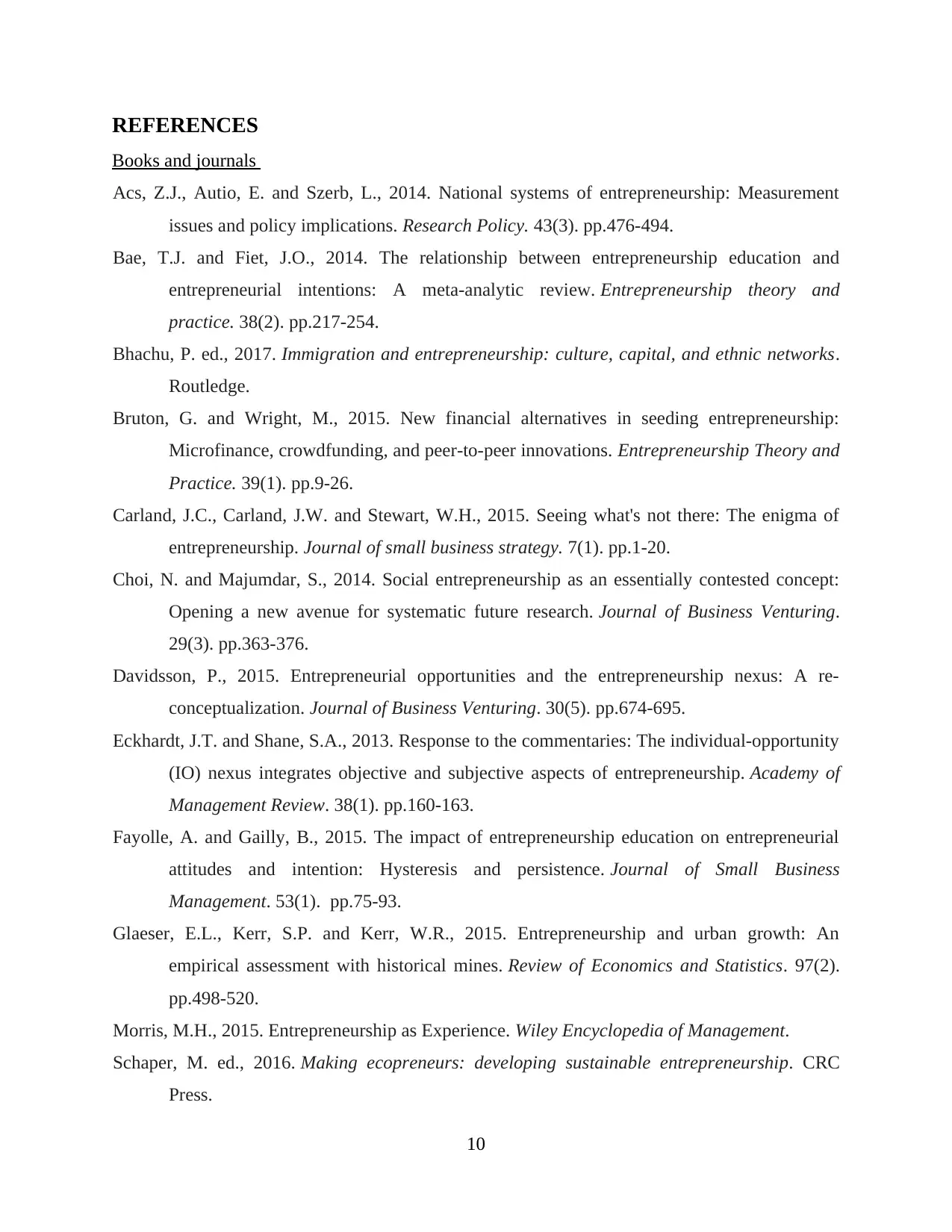
REFERENCES
Books and journals
Acs, Z.J., Autio, E. and Szerb, L., 2014. National systems of entrepreneurship: Measurement
issues and policy implications. Research Policy. 43(3). pp.476-494.
Bae, T.J. and Fiet, J.O., 2014. The relationship between entrepreneurship education and
entrepreneurial intentions: A meta‐analytic review. Entrepreneurship theory and
practice. 38(2). pp.217-254.
Bhachu, P. ed., 2017. Immigration and entrepreneurship: culture, capital, and ethnic networks.
Routledge.
Bruton, G. and Wright, M., 2015. New financial alternatives in seeding entrepreneurship:
Microfinance, crowdfunding, and peer‐to‐peer innovations. Entrepreneurship Theory and
Practice. 39(1). pp.9-26.
Carland, J.C., Carland, J.W. and Stewart, W.H., 2015. Seeing what's not there: The enigma of
entrepreneurship. Journal of small business strategy. 7(1). pp.1-20.
Choi, N. and Majumdar, S., 2014. Social entrepreneurship as an essentially contested concept:
Opening a new avenue for systematic future research. Journal of Business Venturing.
29(3). pp.363-376.
Davidsson, P., 2015. Entrepreneurial opportunities and the entrepreneurship nexus: A re-
conceptualization. Journal of Business Venturing. 30(5). pp.674-695.
Eckhardt, J.T. and Shane, S.A., 2013. Response to the commentaries: The individual-opportunity
(IO) nexus integrates objective and subjective aspects of entrepreneurship. Academy of
Management Review. 38(1). pp.160-163.
Fayolle, A. and Gailly, B., 2015. The impact of entrepreneurship education on entrepreneurial
attitudes and intention: Hysteresis and persistence. Journal of Small Business
Management. 53(1). pp.75-93.
Glaeser, E.L., Kerr, S.P. and Kerr, W.R., 2015. Entrepreneurship and urban growth: An
empirical assessment with historical mines. Review of Economics and Statistics. 97(2).
pp.498-520.
Morris, M.H., 2015. Entrepreneurship as Experience. Wiley Encyclopedia of Management.
Schaper, M. ed., 2016. Making ecopreneurs: developing sustainable entrepreneurship. CRC
Press.
10
Books and journals
Acs, Z.J., Autio, E. and Szerb, L., 2014. National systems of entrepreneurship: Measurement
issues and policy implications. Research Policy. 43(3). pp.476-494.
Bae, T.J. and Fiet, J.O., 2014. The relationship between entrepreneurship education and
entrepreneurial intentions: A meta‐analytic review. Entrepreneurship theory and
practice. 38(2). pp.217-254.
Bhachu, P. ed., 2017. Immigration and entrepreneurship: culture, capital, and ethnic networks.
Routledge.
Bruton, G. and Wright, M., 2015. New financial alternatives in seeding entrepreneurship:
Microfinance, crowdfunding, and peer‐to‐peer innovations. Entrepreneurship Theory and
Practice. 39(1). pp.9-26.
Carland, J.C., Carland, J.W. and Stewart, W.H., 2015. Seeing what's not there: The enigma of
entrepreneurship. Journal of small business strategy. 7(1). pp.1-20.
Choi, N. and Majumdar, S., 2014. Social entrepreneurship as an essentially contested concept:
Opening a new avenue for systematic future research. Journal of Business Venturing.
29(3). pp.363-376.
Davidsson, P., 2015. Entrepreneurial opportunities and the entrepreneurship nexus: A re-
conceptualization. Journal of Business Venturing. 30(5). pp.674-695.
Eckhardt, J.T. and Shane, S.A., 2013. Response to the commentaries: The individual-opportunity
(IO) nexus integrates objective and subjective aspects of entrepreneurship. Academy of
Management Review. 38(1). pp.160-163.
Fayolle, A. and Gailly, B., 2015. The impact of entrepreneurship education on entrepreneurial
attitudes and intention: Hysteresis and persistence. Journal of Small Business
Management. 53(1). pp.75-93.
Glaeser, E.L., Kerr, S.P. and Kerr, W.R., 2015. Entrepreneurship and urban growth: An
empirical assessment with historical mines. Review of Economics and Statistics. 97(2).
pp.498-520.
Morris, M.H., 2015. Entrepreneurship as Experience. Wiley Encyclopedia of Management.
Schaper, M. ed., 2016. Making ecopreneurs: developing sustainable entrepreneurship. CRC
Press.
10
⊘ This is a preview!⊘
Do you want full access?
Subscribe today to unlock all pages.

Trusted by 1+ million students worldwide
1 out of 13
Related Documents
Your All-in-One AI-Powered Toolkit for Academic Success.
+13062052269
info@desklib.com
Available 24*7 on WhatsApp / Email
![[object Object]](/_next/static/media/star-bottom.7253800d.svg)
Unlock your academic potential
Copyright © 2020–2026 A2Z Services. All Rights Reserved. Developed and managed by ZUCOL.





